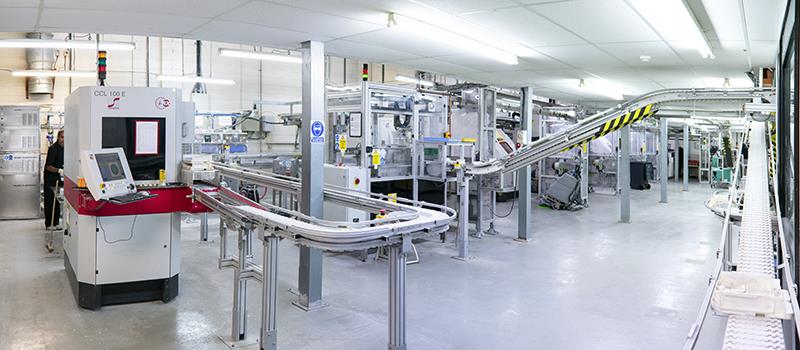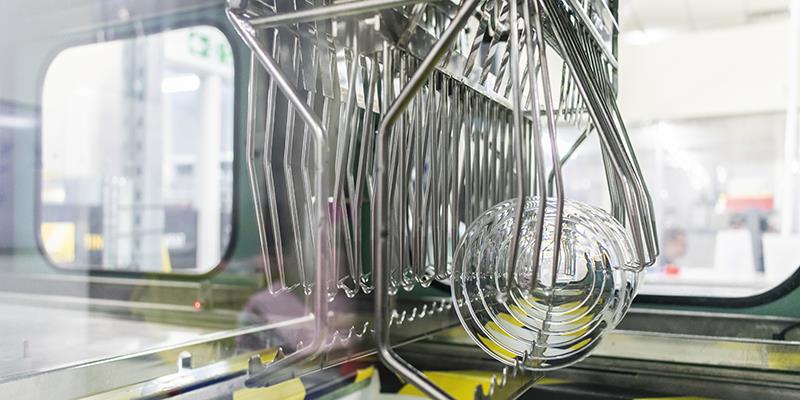In 2017, the Nikon brand turned 100 years old, having invested in the research and development of optics in order to create the lenses that it produces today. There is an optical lens in every Nikon product, including cameras, microscopes and telescopes.
Twenty years ago, Tatsuo Ishitoya, head of Nikon Optical and the former managing director, relocated from Japan to start up a lens laboratory in England. He chose Milton Keynes because of its central location in the country and accessibility to motorways for transporting and distributing the products, but also because there was a Japanese school located there that his children could go to.
The company now employs 106 members of staff, with approximately 15 employees having worked there between 10 and 20 years. Employees are encouraged to become multi-disciplined and to constantly develop new skills about the manufacturing process. A total of six glazing technicians work at the site and two of them are specialist craftsmen who produce glazing results you cannot get with a machine, particularly with high base lenses and strong prescriptions.
Isabelle Abrieux, head of marketing and professional services at Nikon Optical UK, says: ‘Our AR team who do the coatings have between them around 80 years of experience, so the process is about the people as well as the investment we put behind the machinery.’
Indeed, the team behind Hoffmann Natural Eyewear paid the lab a visit recently to educate the Nikon staff about Buffalo horn andt was impressed with the work they do. It resulted in the company’s first accreditation in the UK, which they are immensely proud of. Nikon has also reached a milestone of becoming Lindberg accredited and is one of the few labs in the UK to be so.
Always optimising its machinery and standard of work, the company launched its SeeCoat Drive lens coating in April this year, to meet the visual needs of driving. It is one of the first to offer the option of a 1.74 index as well as 1.67, 1.6 and 1.5, which can be put on the full range of products offered by the company.
Abrieux believes that the company is often ahead of trends in lens coatings.
‘We have invested over the years to make sure that the quality of lens production matches the quality of our design. We launched our SeeCoat Blue lens coating five years ago and then started to see others bringing out a similar product. Last year we unveiled our SeeCoat Bright coating and we expect others to follow up with something like it. We’re the only people in the country so far to do SeeCoat Bright, so we like to think we’re innovative.’
The Nikon lab has a well thought out and structured workflow process that is spread out across several areas. It is frequently updated and optimised in order to shave fractions off the time in which it takes to complete the manufacturing process, as even a matter of seconds can make a significant impact on how fast the company is able to complete the process and deliver the lenses to customers.
After receiving a prescription, frame selection and special parameters for each patient, the measurements are transferred to the Nikon Optical Design Engine in Japan, where the calculations take place. The lenses are then optimised out of 93 quintillion possible combinations to find the perfect one. During its journey the lens travels through eight different processes across a conveyor system and four inspections to ensure the finished product is of a high standard.
Most of these processes are automated but a few, like tinting the lenses, can only be done by hand due to the precise nature of the task. All of Nikon’s lenses are manufactured and digitally surfaced using the latest freeform technology – with diamond headed tools – in order to offer customers the highest quality possible. As the bespoke lenses are made in the UK, no time is taken up in shipping, ensuring that customers receive them much faster. A total of 98% of orders are completed within four days, with glazed options usually taking five days.
The inspections occur at the prescription check, after the hard coating and anti-reflection coating, as well as one final check before the lenses leave the lab.
Green credentials
The lab tries to be green in dealing with waste product. Jill McLellan, sales director at Nikon Optical UK, says: ‘Instead of using an electrical generated machine pumping in air conditioning, we process and use the air from outside to keep the temperatures inside stable, as well as cleaning and recycling water and recycling all cardboard and packaging.’ Plastic that cannot be recycled completely is compressed in order to minimise the amount left over.

There are eight stops on a lens’ conveyor belt journey through the lab
What does Nikon offer that is different to other labs? ‘We offer a special fast track service for the delivery of our lenses. What makes us unique is that we are able to deliver stock cut lenses in 24 hours, uncut rx lenses and remote edge rx lenses in 48 hours and glazed rx lenses in 72 hours to our customers who want to receive them quickly,’ says Abrieux. Some customers even send their own courier out to the lab to collect the lenses even quicker than other delivery services offered.
Nikon also has SeeMax technology, which takes the shape of the frame into account in the calculation by pushing any aberrations outside of the area of the lens that is going to be used for the frame. This technology is used on the company’s premium single vision and progressive lenses.
The brand is independent focused, so is not available in any large nationals. The lab also makes products that are exported to more than 20 countries alongside ones to be sold in the UK. Customers can place their lens orders by telephone, email, fax or online through the company’s My Nikon World electronic ordering system. Remote edge or uncut lens orders are often received through this format. ‘Customers input all the order’s information and choose fast track or standard service and delivery. A lot of people choose to order in this way because it’s more convenient,’ McLellan says.
Nikon’s customer service team is based in the same building as the lab – highly convenient for any issues that may arise as they can simply walk downstairs and explain the problem to the manufacturing workers. This ensures very tight communication with little room for errors. ‘The customer services team have a strong relationship with the customers the company receives orders from, offering a bespoke and personalised service which appeals to independents,’ says Abrieux. ‘This department of ours is well known, recognised and praised for its high standard throughout the country and online. We’re proud of this.’

98% of orders are completed in four days
Optician partners have reported back to the company that they enjoy working with them. McLellan says: ‘It’s a differentiator for their business to host our brand. As all of Nikon’s products contain a lens, it’s relevant for patients who can recognise the name from cameras, for example. It’s an easy discussion point as patients feel they can trust the brand and customers can profit from it.’
As well as tracing frames for glazing and offering catalogue shapes for sports and rimless frames, Nikon uses an MEI Shape Finder, which scans any type of lenses to shape them. ‘Even if a customer sends in half a lens or a broken one, we can recreate it using this machine,’ Amy Baig, professional services manager at Nikon Optical UK says.
Trends identified in incoming orders have been for SeeCoat Drive, SeeCoat Bright and sunwear lenses. Baig says: ‘People want bespoke and personalised designs more and more. We’re the only people in the UK who offer SeeCoat Bright, no one else has it.’ The company has the largest range of lifestyle coatings on offer, so there is a lot of choice for customers depending on what they want.
Baig sums up the Nikon Optical experience in a sentence: ‘Above all, our customers want Japanese technology, British production and bespoke personalised service.’
